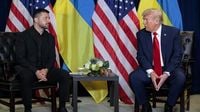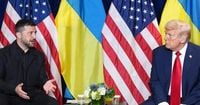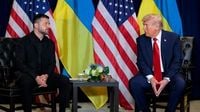President Donald Trump’s recent about-face on the war in Ukraine has sent ripples through political circles at home and abroad, sparking cautious optimism among Ukrainian communities and measured skepticism from security experts. The dramatic shift, which Trump made public on September 23, 2025, during a high-profile meeting with Ukrainian President Volodymyr Zelenskyy in New York, marks a major departure from his administration’s previous stance—and, perhaps just as notably, it has left his own political base mostly unmoved.
For Chicago’s sizable Ukrainian-American population, the news was met with a mix of hope and wariness. According to WLS, Ukrainian flags have been a fixture in Chicago since Russia’s invasion began three and a half years ago, but morale had waned after Trump’s earlier comments urging Ukraine to accept a deal with Russia and cede territory. Trump’s previous posture was underscored by a frosty first meeting with Zelenskyy months prior and a controversial welcome extended to Russian President Vladimir Putin in Alaska this August.
But the president’s latest declaration—“Let them get their land back,” as he posted on social media—has injected a new sense of possibility. The reversal comes just weeks after Trump had told Zelenskyy in the Oval Office, “You don’t have the cards,” bluntly suggesting Ukraine should accept concessions to end the war. Now, Trump not only says Ukraine could reclaim all of its lost territory, but, as Axios reported, he even mused that Kyiv might “go further than that.”
Despite the bold rhetoric, Trump made clear that the U.S. would not ramp up direct financial support for Ukraine. Instead, he said, Washington would continue selling weapons to NATO allies, leaving it to them to decide how to use the materiel. Trump also warned that future tariffs on Moscow would depend on Europe’s willingness to reduce its reliance on Russian energy.
The response from Trump’s core political base—often referred to as the MAGA movement—was surprisingly muted. Axios noted that, in previous years, such a dramatic policy shift would have caused an uproar among Trump’s supporters, who have long been wary of American involvement in foreign conflicts. Yet this time, the reaction was one of fatigue and indifference, with right-wing media outlets burying coverage of the announcement and podcasts barely mentioning it. MAGA-world sources told Axios that the base is simply “frustrated with the war” after both Kyiv and Moscow brushed off peace talks, and that domestic issues have taken precedence following recent turmoil in the U.S.
Not all of Trump’s coalition was content to shrug off the reversal. Josie Glabach, a prominent right-wing influencer, told Axios, “Anytime Trump changes his position and makes a statement like today... it feels like we’re resetting and even farther away from an end of this war.” Steve Bannon, a leading MAGA podcaster, suggested that the lack of outrage reflected a belief that Ukraine has become “politically toxic” for Trump, and that his new rhetoric wouldn’t lead to deeper U.S. involvement.
In Chicago, the Selfreliance Association—a group that has helped over 35,000 Ukrainian refugees settle in the area—expressed hope but remained cautious. “I really hope that this is going to be backed by real actions and real help for Ukraine,” said Dr. Mariya Dmytriv Kapeniak, president of the Ukrainian Congress Committee’s Illinois Division, in comments to WLS. Olena Levko-Sendeha, program director at the Selfreliance Association, echoed that sentiment: “I’m just afraid. I believe this when we see that in action.” Still, she emphasized, “They are standing their ground. They’re protecting their culture, tradition, language, everything, and they are not giving up.”
On the international stage, Trump’s reversal coincided with a renewed push by Zelenskyy at the United Nations, where he called on world leaders to punish Russia and support Ukraine’s efforts to regain its territory. U.S. Secretary of State Marco Rubio met with his Russian counterpart, urging Moscow to take meaningful steps toward resolving the conflict.
Experts and officials outside the U.S. offered a range of reactions. Former CIA Moscow station chief Dan Hoffman told Fox News Digital that “words alone will have little effect on Russian President Vladimir Putin.” Hoffman argued that the U.S. needs to lift strike restrictions and enforce secondary sanctions immediately if it wants to impact Russia’s war chest. He also called for NATO allies to step up, including providing Ukraine with long-range missiles and closing strategic waterways to Russia’s shadow fleet.
Russia, for its part, dismissed Trump’s optimism. Kremlin spokesperson Dmitry Peskov told Reuters that Trump was “mistaken” about the war’s progress, pointing to what he described as a stagnant front line that has seen few major advances since early 2024. Indeed, the conflict has remained largely frozen for the past 18 months, with both sides achieving only minor territorial gains.
Some European officials, however, found Trump’s new position encouraging. Lithuanian Defense Minister Dovilė Šakalienė told Fox News Digital, “I completely agree with the statement that, definitely, Ukraine has a right and a chance, with our full support, to go back to regain its original borders, its internationally recognized borders. Because why not?” She warned, though, that without greater U.S. and NATO support, Russia would continue to threaten NATO countries and escalate the conflict.
Yuriy Sak, former defense advisor to Zelenskyy, offered a pragmatic perspective: “We’ve never had the ambition to conquer Russian territory. We don’t need it. We just want them out of our land.” Sak added that, while Trump’s comments were seen as a confirmation of U.S. alignment with NATO, Ukraine does not expect immediate action, and any resolution will likely require a mix of military and diplomatic measures over a long period.
For many in Chicago’s Ukrainian community, the message was clear: while Trump’s shift in tone is a welcome change, concrete action is what matters most. Until then, they say, their resolve remains unshaken—regardless of the political winds in Washington or Moscow.
In the end, Trump’s reversal on Ukraine highlights the complexities of international politics, the limits of rhetoric, and the enduring hope of those most affected by the war. Whether the president’s new position will translate into meaningful support for Ukraine—or simply mark another chapter in the ongoing saga—remains to be seen.



